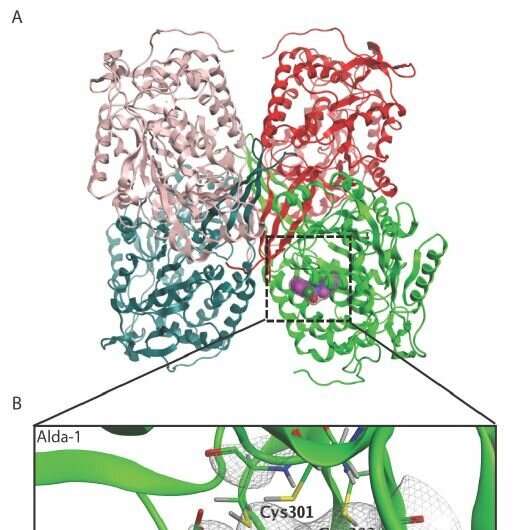January 26, 2023 report
This article has been reviewed according to Science X's editorial process and policies. Editors have highlighted the following attributes while ensuring the content's credibility:
fact-checked
peer-reviewed publication
trusted source
proofread
SGLT2 inhibitor found to reduce endothelial dysfunction associated with ALDH2 alcohol face flushing variant

A team of researchers at Stanford University working with two colleagues from Greenstone Biosciences has found that an SGLT2 inhibitor can reduce endothelial dysfunction commonly associated with the ALDH2 alcohol facial flushing variant.
In their study, published in the journal Science Translational Medicine, the group conducted a genome-wide study of patient data in a biobank looking for associations between the ALDH2 variant and increased risk of coronary artery disease and tested the impact of several drugs to see if they could reduce the risk.
People with an ALDH2 gene variant experience facial reddening when drinking alcoholic beverages. This is because the variant makes it more difficult to metabolize alcohol. Those with the variant also have a higher risk of developing coronary artery disease. Prior research has shown that approximately 8% of the people in the world today have the variant. In this new effort, the researchers analyzed patient data in Biobank Japan to better understand why the variant puts carriers at higher risk of artery disease.
The work involved the analysis of data for 29,319 patients with coronary artery disease and comparing them to 183,134 controls. The researchers found what they describe as strong associations between ALDH2 and coronary artery disease. They also found that just one standard alcoholic beverage had a noticeable impact on the function of endothelium in blood vessels. And they found that carriers who defined themselves as heavy drinkers were four times more likely to develop coronary artery disease than the general population.
Because they found that carriers had problems with endothelium in blood vessels, they tested current therapies aimed at treatment of inflammation and impairment of arterial endothelium in mice. They found that the SGLT2 inhibitor empagliflozin counteracted the effects of the variant and reduced such problems. If such drugs work in similar ways in humans, the researchers note, they could conceivably be used to reduce the risk of developing coronary artery disease in patients with the ALDH2 variant.
More information: Hongchao Guo et al, SGLT2 inhibitor ameliorates endothelial dysfunction associated with the common ALDH2 alcohol flushing variant, Science Translational Medicine (2023). DOI: 10.1126/scitranslmed.abp9952
© 2023 Science X Network




















